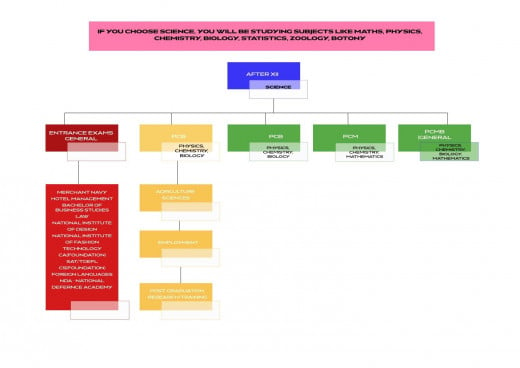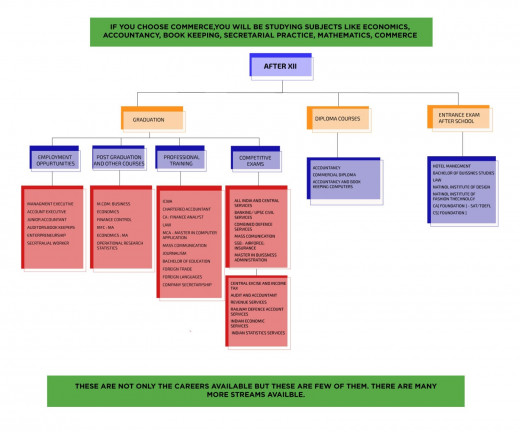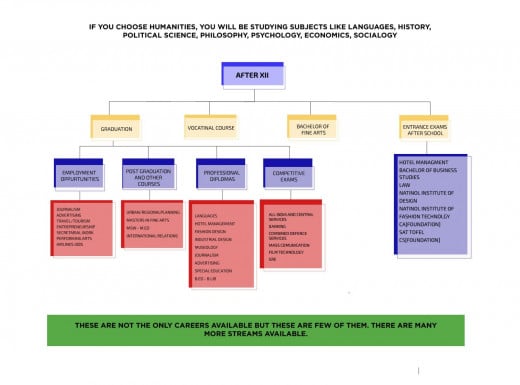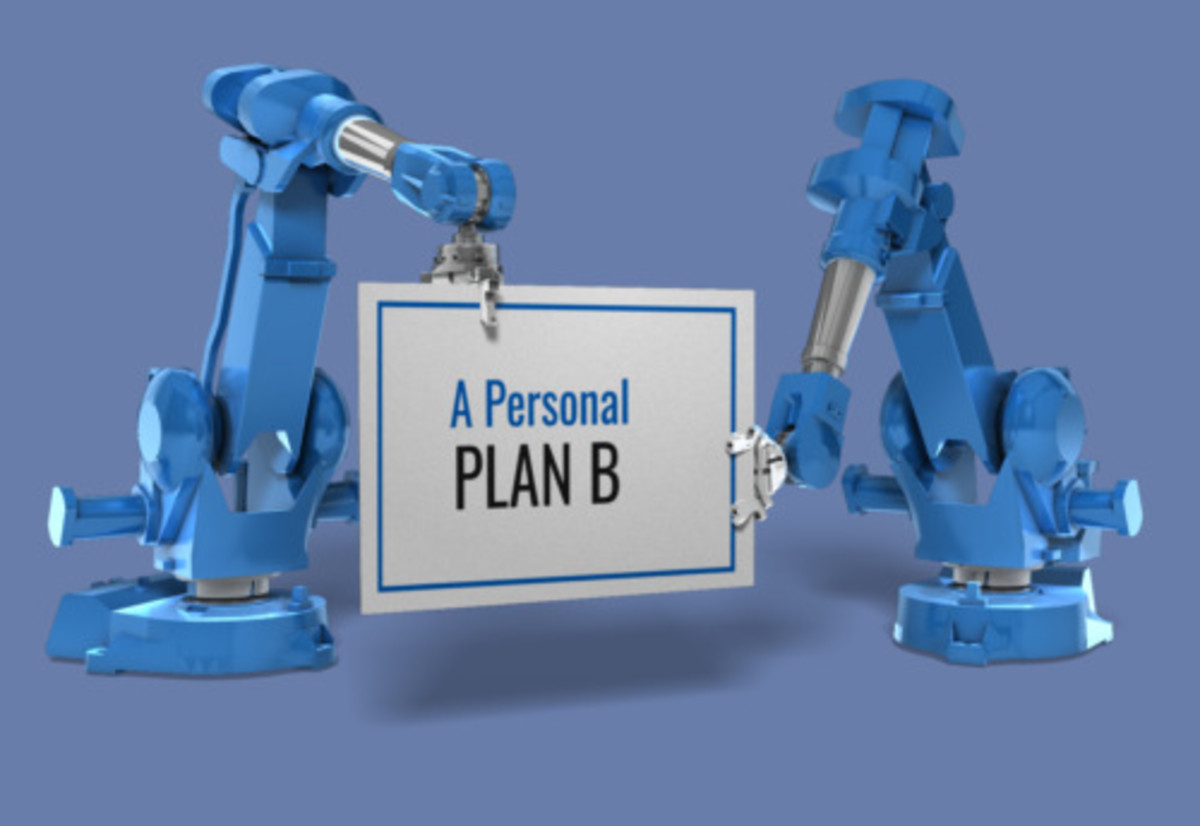What Is Career Planning?
Career Planning
Self-appraisal and confidence
In planning your life, it is necessary for you to avoid over-confidence or exaggerated ideas of you competence as much as confidence nor underestimate your ability. Correct self-appraisal and self-confidence hold the key to any planning in life. The first thing you should do is to enlist the careers/ professions after your heart, in the order of your interest in them. The second thing is to prepare an effective 'check-list' and find out how far you fulfill the requirements laid down for one's entering those profession or pursuing those careers, you seek the help of educational counselors if you have any difficulty in this connection. It is a kind of 'made for each other' test. Your list of priorities may have to be recast in the light of your evaluation to the extent to which you satisfy the requirements of the careers or professions which attract you. You should nevertheless have a crack at all the entrance examinations for which you are eligible so that you have no regrets later if you miss those that are high in your list of priorities. Life is not a gamble; if the best has eluded you, the second best should be tried. For all you know, this may prove to be better for you in the long run. Decision making for a career In drawing up your personal priorities or likes, prudence requires that you should not merely give them as much thought as you can yourself, but also consult your parents, and those who are close to you and wish you well. In either case, you should have a frank and free discussion with your parents and you should be able to convince each other what is good for you. If you have a flair or special aptitude in particular -say, teaching, research or tennis or cricket you should reflect on the wisdom of your plumbing for it as you sole occupation or source of income, or using it as a stand-by or additional occupation to which you can have recourse either exclusively or on a part time basis or as an alternative, if your targeted objective turns out to be frustrating for some reason or other.
No short cut to success
You should never kid yourself and expect wishful thinking to materialize without hard and sustained effort. There is not short-cut to success in life. Nothing can ever be achieved without determination, application, honesty and a sense of realism. But realism should not be confused with cynicism or an inferiority complex. You must have seen some people always talking of corruption, favoritism, nepotism and so on. They are merely finding excuses for their own inadequacies. Life is certainly not a bed of roses. But it is also not all thorns and snares. It is a challenge and if you are equal to it ; don't waste time in mere self-pity or morbid complaints about others. Don't fail to turn to your parents if you have any misgivings or problems. Don't mistake their concern for you as evidence of their lack of confidence in you. You cannot get for money what you can secure from them for love. Keep an open mind and carry them with you, if you cannot, for any reason abide by their advice. Still if you are unable to reconcile your differences, the services of qualified educational and vocational counselors are always available. They will certainly be able to resolve your differences and guide you in the right direction.
What's in a career?
Career determines lifestyle and the work environment, routine, earnings, job style, comfort, challenge, physical exertion, etc. When you are choosing a career, you are also deciding a way of life, a lifestyle. If you have not considered what you expect from your job - power, money, command, power you may find going tough. An aptitude for the work you wish to do, along with interest in it is absolutely vital for growth in any profession. You may have noticed some people complaining perpetually about work. It may be worthwhile investigating, why is it so? Un-flagging involvement comes with interest and reinforcements come in the form of promotion, monetary incentives, recognition and involvement. Progress comes with determination as well as concerted effort. Success leads to what is generally termed as 'job-satisfaction. In choosing a career it is important that you know yourself well, what you want from your profession and also what the world of occupation has to offer.
Specialization with in each profession has taken over from generalist. From the medical profession - where super specialists rule the roost - to finance specialists, from the government to private sector, from the industrialist to the small entrepreneur, all can boast of their specialized professionals. The photo journalist has recently acquired identity and now you already hear of the fashion photographer the environmental photo-journalist and the like.
Specializations are here to stay. Gone are the days when grandfather’s profession was handed down through generations, and the family torch had to be carried forward. It is an age of self-identity and self-expression.
Making a choice
Everyone aspires to choose the right kind of profession. There' is a crying need in every human being to use his talents and give expression to his personality. Yet many young people stumble or just drift into a job giving little thought to the consequences. They make career decisions for superficial reasons and land up with inappropriate career choices resulting in dissatisfaction and Unhappiness.
Why do people make poor work choices?
People do make poor choices essentially because they take up jobs without taking themselves into consideration i.e. without assessing their aptitudes, interests and personality. They May take up courses and careers for only some superfluous reasons, e.g., under their friend's influence, or to suit their parents' desires or take the easiest available opportunity. When the reasons are not at all related to self-knowledge and personal needs, choices tend to be distorted. The ultimate consequence of a poor choice in careers results in dissatisfaction and frustration. Dissatisfaction leads to unhappiness, boredom, stress and physiological threats. work is a major source of personal identity. It is wrong to presume that there is only one kind of work a person can do over a whole life time. Certain highly gifted people do have one pre-dominant talent and interest,' which is expressed over a lifetime. But most of us have a range and combination of talents that equip us for a number of jobs.
While making work choices, select those kinds of work where the combinations of aptitude, interest and personality are strong assets : and avoid selecting work where the discerned aptitudes are weak and where interest cannot easily be adapted. A strong combination (or at least an above average one ) would ensure a fundamental potential to do the work and grow in it . Of course work choices also depend upon the opportunity and individual need at that time. Nevertheless, even in such a situation, the individual should not allow himself to 'give up'. He should wait, watch and be alert for opportunities to make purposive change and adaptations. This is the 'secret' of all those who rose from the bottom to the top.
Awareness of your 'true' motivations, aspirations, dreams, strengths, aptitudes, interest, likes, dislikes, limitations and weakness are essential. This awareness must be as specific as possible. It must be backed by actual evidence, i.e., by actual achievements and behaviors and, if required, supplemented by objective test-results and professional assessments. If you accept a job through a conscious process of assessment, you are less likely to be disappointed and disillusioned later.
Follow the golden rules
Remember the following golden rules when you decide about your career:
• Make a list of work options. Look at these options: see if you have the required support for these realistic options that are open to you at present.
• Expose yourself to wider knowledge by attending career exhibitions and talks, reading and, above all, talking to people in your field of interests. People love to talk about their work, particularly if they are successful.
• Try to obtain a true description of the work as it really is - the' truth' as it were. This relates in particular to 'glamorous' and 'prestigious' jobs, where the job content on analysis may be less than satisfying. You may still accept the job, because glamour prestige and money are more important to you than job content.
Unhappy experience can be avoided by finding answers to simple questions at the outset.
• What is involved in this job? Do I feel good about it?
• Try and make an assessment if there is likely to be a conflict between your personal values and those of your work place. This assessment is particularly important in the case of value-sensitive people.
• Try to obtain some kind of 'feel' of the actual work environment. This is important in the case of environment-sensitive people. While the aptitude and ability may be there, the work environment may not suit the personality of the individual concerned. As such, the environment acts as a significant obstacle to the expression of abilities.
• You need to be alert and sensitive to your inner self, and to the opportunities in the environment.
Academic versus vocational careers
Our educational system follows the 10+2+3 system, (or 10+2+4 )i.e., going through school, college and university. This is the academic stream while the vocational stream may begin after class VIII, after class X or even at college. The academic pursuit necessarily draws on the intellectual development of the individual while the vocational stream develops critical jobs skills. It only needs a fresh look at the worth of each career with an open mind.
Science Careers Opportunities

Personality Analysis
Personality - To suit a career
What is personality?
Generally personality is described by a single dominant characteristic '0" weak, strong, polite, shy, smart, good, etc. Personality is a very complex psychological concept, difficult to define. It is a concept by which we understand and view ourselves. Normally external appearance and behavior are the main characteristics which are used to describe personality. Personality varies and can be seen along a continuum from one extreme to the other in its several dimensions.
In terms of occupations, people vary in personality types in terms of sheer tolerance. Some can work endlessly; others cannot sustain themselves through hard work. Marching occupational requirements with personality characteristics is a very important part of career guidance, Holland showed way. He gave a personality job fitness classifying six personality types matching them with occupations. I briefly describe here the personality types and possible occupational choices to help you in making decisions.
• The mechanical personality type - He is aggressive and one who likes physical activity. He requires skill, strength and such people prefer engineering, technical and mechanical jobs.
· Investigative personality type-He prefers activities which require thinking, organizing and understanding rather than feeling or emotion. Such personalities are scientific in their outlook and can go in for careers which are oriented to research leading from higher studies.
• The social personality type - He likes interpersonal interaction rather than intellectual or physical activities. Service are best suited for this personality type. They may also consider international affairs, foreign service,
• The enterprising personality type - He influences others and wants to have power and status. Administrative services, law, public relations, business management and politics are professions which would be ideally suited.
• Artistic personality type- He is involved in self-expression, artistic creation or emotional activities. Artistic professions are those related to the Arts - drawing, paintings, music, drama, writing, etc.
The introduction to various clusters will further give you an insight into personal qualities needed in various occupations.
Are you creative?
Creativity is a dynamic quality in individuals which seeks expression in whatever they do. This is an important quality which can be channelized fruitfully into a career. Creativity is valuable for careers related to arts, music, creative writing, dance, drama, advertising, mass communication, fashion, designing, all forms of applied art, packaging, animation, cartooning, interior designing, architecture, poetry, etc. Nurturing creativity is important. Anyone who has even a slight interest must explore it. I have noticed that if creativity is cramped, it generally causes frustration and restlessness among individuals. You can find out how creative you are:
• By answering the following questions:
· Are you (a) practical or (b) innovative?
· Can you complete your work on time?
· Do you often get anxious about routine jobs?
· Do you take the lead in social functions?
· Do you follow a schedule?
· Do you enjoy activities in which you have scope to influence others?
· Are you generally contended?
· Are you a dreamer?
· Are you generally considered social?
Calling on parents
Many-many students have suggested the need to reach out to parents to help them in their crusade for making them-selves heard. There is nothing which gives more happiness to me than one where a child has been allowed to help to reason out why a particular choice of career is more appropriate to child. Parents must make an analysis themselves by observing the child carefully, identifying his tastes, making note of his interests and hobbies. They need to consider, what the child likes to do, read a book, paint, or assemble a model. How does he keep himself busy? What questions does he ask, those relating to theoretical knowledge or practical questions. Parent’s judgment can be helped by educational psychologists who use aptitude tests, interest measures and personality questionnaires at early adolescence to determine natural aptitudes and inclinations of a child. At the end of such a test a counseling profile is prepared.
The process helps to determine whether the young adolescent is creative, more oriented to skill than academics, what special interests he has, the personality he has, etc. Vocational guidance most certainly does not intend to prove your child's suitability to a job but generally highlights the potentialities and inclinations, values your opinion and observation and gives alternatives to be considered. There are umpteen routes to reach the same goal that is what guidance would do, enhance your understanding of your child.
There are children who have been academic unfits. They should not be viewed with a feeling of helplessness or rejection. You will find information on careers for them.
Open school education of Central Board of Secondary Education aims to provide Educational Opportunity to children who find the normal school curriculum too rigid. Summer jobs give students an occasion to explore career options but parents must emphasize on the real purpose of this experience which must not be extra earnings only. This would keep career development in its dear perspective.
Design your career while the country is facing a crisis in providing employment to the youth, there remains a gap between opportunities and human resource development. In a situation where our planners are bogged down in keeping pace with the growing population, individual's need for work and channelizing of energies cannot be kept in abeyance. In this context as well as in the context of my belief that individual potentials are varied and may not find absolute satisfaction in existing careers, I wish to introduce the concept of 'design your own career'.
Every individual varies in the combination of aptitudes, interests, and personality. The difference exists in the assortment of these so to say. This assortment needs to be identified and a new career Planned using inputs from existing professions.
A 'step aside profession
In the course of describing certain professions, I have suggested that they may be considered as possible 'step aside' professions too. I have experienced and noticed two facts while helping students to plan their careers: one that some students are bright and have a variety of interests. All these cannot be tapped or satisfied in a single profession. They need to find a way to give expression to these latent interests. Secondly, in the course of one’s life (this is with particular reference to girls) there are times when a full-time job is a hindrance in the fulfillment of other responsibilities, e.g., child rearing, further education, etc. What then? A step aside profession here serves to fill this gap.
Careers in Humanities









